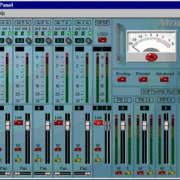PLEASE NOTE: This article has been archived. It first appeared on ProRec.com in October 1998, contributed by then Editor-in-Chief Rip Rowan. We will not be making any updates to the article. Please visit the home page for our latest content. Thank you!
Mastering.
The word is a meaningless black cloud to many musicians and amateur engineers. And, sad to say, some pros.
I used to wonder what the hell the mastering engineer even did. After all, the song is mixed, right? What else really needs to be done?
Also I got really suspicious when the same names kept popping up. Bob Ludwig. Bernie Grundmann. Eddie Schreyer. Ted Jensen. Stephen Marcussen. Do these guys ever sleep?
Maybe – MAYBE – they really don’t do anything at all.
Or maybe they are the operators of the Magic Mastering Machine – one button, that’s all. Feed your mix in and out comes the mastered product.
Well, this is sheer balderdash. Mastering is one of the most important and least understood roles in commercial music production, and you have to understand it if you’re going to engineer a product that will stand up on CD, on tape, on RealAudio, and most importantly, on the radio.
This article does not presume to teach anyone how to master music. Instead, it should illuminate the important reasons why you need to have a professional master your product if you want professional results.
The Problem, pt. 1
The problem is simple: there is no perfect listening environment. Each control room has its own idiosyncrasies. It’s a function of the speakers, the room dimensions, the listening position, the building construction. No two rooms sound alike, and no room is ideal.
Prove it to yourself by taking your favorite CD around to some good studios and you’ll understand immediately. One studio in my town that shall remain nameless produces a lot of television advertisement music. They know that the majority of the listeners of their music are listening with tiny television speakers with no bass or extended treble, and that everything is going to be mightily compressed by the television broadcasters.
You might think that their modus operandi is to do a lot of monitoring on Auralex speakers or Minimus 7s. Nope. They use nice Genelecs with a large subwoofer. In a small control room, the effect is thunderous.
Why, you might ask?
Because, Grasshopper, the CLIENT makes hot dogs or sport utility vehicles or tampons, and doesn’t know or care about what the viewer is going to experience. The CLIENT is a schmuck with a $50K budget to produce a :30 second television spot, and BY GOD when they go to hear the music they paid for, the experience must be BREATHTAKING.
Thus the Genelecs.
So no studio is really “flat” and if anyone tells you so, run. It isn’t possible. You can minimize the effects of speaker peculiarities, resonance nodes, and early reflections. But you can’t make the room aurally invisible.
Therefore, every mix has it’s own unique sonic stamp resulting from the sound of that particular studio. The stamp is minimal if the music is engineered by a talented pro with a great room. The stamp is significant, maybe crippling, if the music is produced by a rank amateur in a home studio.
Therefore, the solution: before committing to manufacturing, it pays to apply a last level of equalization in a totally different sonic space.
Mastering engineers use two kinds of equalization: EQ, and multiband compression. EQ is used when the whole mix is too bassy, or too bright, or not warm enough. Multiband compression is used to help trim away nasty frequencies that jump out from time to time but otherwise do not need attenuation. A good example of this is to reduce sibilance on a harsh vocal. Mastering engineers also use multiband compression to fatten up the bass – by limiting the peaks, the overall bass level can be brought up without ripping the speakers to shreds.
The Problem, pt. 2
The other problem you face, Grasshopper, is that your are inherently limited in your ability to hear everything all at once. It is useful if we can all have the humility to say, “there are things in this mix I might have missed.” Thus, quite simply, mastering engineers provide a useful and needed second set of ears. And, maybe more importantly, a different brain.
Mastering engineers have played “second brain” to many other engineers. They have in their Bag of Tricks special tools and techniques to undo damage that we tracking engineers do to the mix.
A Bad Solution
Now you should be able to understand why mastering is best left to someone else. If you try to master your own music, then you are using the same ears, feeding the same brain the same material from your imperfect room. Chances are, unless the mix is perfect to begin with, you are going to apply the same problematic decisions to the mastering process that were made in the mix. The music will get worse, not better.
Squish It!
Finally, mastering engineers apply useful compression and limiting to get your music as loud on CD as possible. Again, they have good tools and techniques for overcoming inherent limitations in the music and getting the sound onto CD – and onto the radio – in a way that ensures your music will have the same volume and punch as any other major release.
This is more than normalization, and limiting, and compression. This may require other techniques, like EQ and multiband, in order to allow the music to get louder. Again, it can be a complex process.
Therefore, it is critically important that when you provide your material to the mastering house, the main mix is fed directly off the board. Do NOT run it through a compressor, a limiter, a Finalizer, or an EQ or anything else. Give the mastering engineer the mix that you are hearing in the monitors. If you think some compression or EQ helps the overal mix, write a note to the mastering engineer and let the mastering engineer make that final decision.
Remember, it is much easier to do than to undo.
Do the Right Thing
If you are serious about your product, you will pay for professional mastering. A good mastering job will make or break many recordings. Listen to material that the engineer has mastered, and find an engineer that specializes in your kind of music. Then pony up and have your music put onto CD in the manner that will make the most of it. When you hear your music with all the energy and punch of other commercial CDs, you will know you got your money’s worth.

